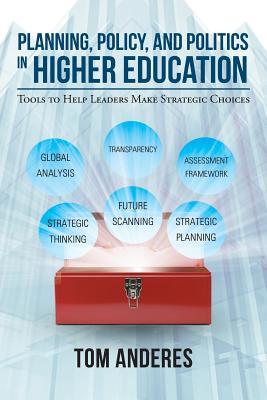Higher education leaders and their teams should always seek to add value to their decision-making processes. Planning, Policy, and Politics in Higher Education: Tools to Help Leaders Make Strategic Choices provides a strategic decision-making model and specific tools to help maximize the opportunities for making successful choices. The model was introduced by Dr. Anderes in the book Navigating Through Turbulent Times: Applying a System and University Strategic Decision Making Model. It is built on the use of new tools, including a planning and assessment framework, future scans, an issue analysis inventory, and decision matrix. The new tools in combination with a strong strategic planning process, transparency for all constituencies, and high quality information focused on the future and globally gives leaders the greatest opportunity to make thoughtful choices aligned with their primary goals.
The strategic decision-making model consists of six components: 1) Creating an organizational mentality committed to strategic thinking, 2) maximizing the amount of high quality historical data and information for analyses to inform decision makers, 3) routinizing the use of globalized scans of the future integrated with other decision-making information, 4) supporting ongoing strategic planning processes, 5) ensuring transparency to incorporate all key constituencies in planning, and 6) implementing a planning and assessment framework that allows leaders to weigh and filter information into thoughtfully constructed strategic alternatives and action plans. The success of the model is based on the integration of all components, with strategic thinking permeating all aspects of decision making.
Board, system, and university leaders and their teams will benefit from the use of the strategic decision-making model in crafting well-informed choices. They will have greater confidence in supporting those choices to the myriad internal and external constituencies they serve. The planning outcomes will be derived from a set of new and expanded resources that provide greater organizational certainty in the final choices. The certainty in the choices will be based on the exhaustive use of the tools in translating strategies into key outcomes and the increased capacity to measure success in meeting board and institutional goals.
